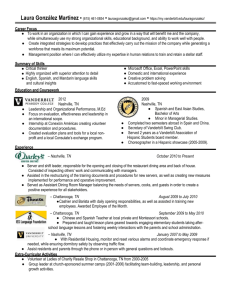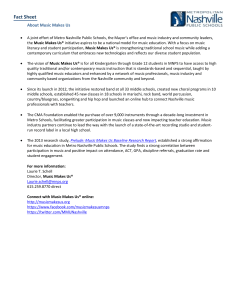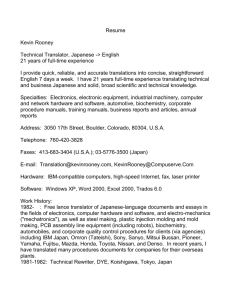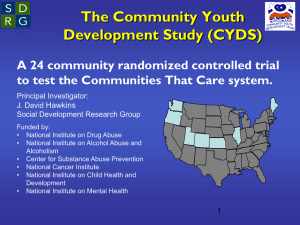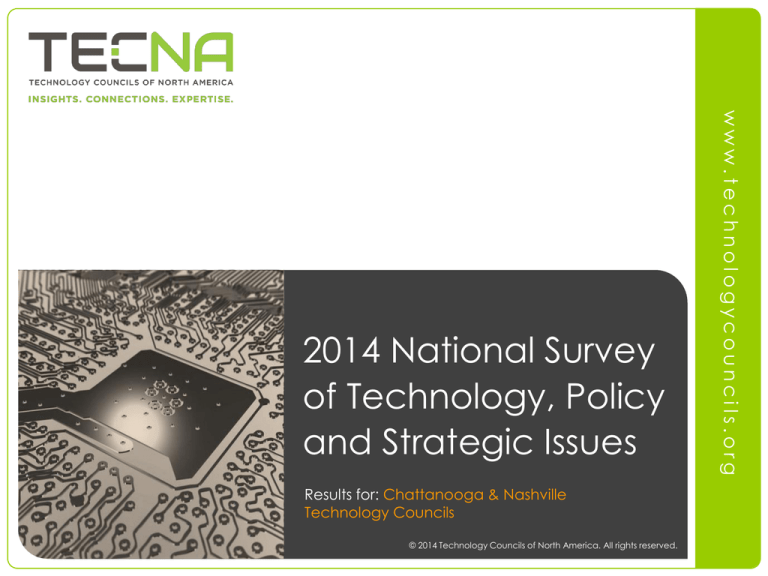
Results for: Chattanooga & Nashville
Technology Councils
© 2014 Technology Councils of North America. All rights reserved.
www.technologycouncils.org
2014 National Survey
of Technology, Policy
and Strategic Issues
About TECNA | CompTIA | TechAmerica
About TECNA
The Technology Councils of North America (TECNA) represents almost 50+ IT and
Technology trade organizations who, in turn, represent more than 22,000 technologyrelated companies in North America. TECNA serves its members and the industry through
its strong peer-to-peer network and its regional initiatives to raise the visibility and
viability of the technology industry.
About CompTIA
CompTIA is the voice of the world’s information technology (IT) industry. Its members
are the companies at the forefront of innovation; and the professionals responsible for
maximizing the benefits organizations receive from their investments in technology.
CompTIA is dedicated to advancing industry growth through its educational programs,
market research, networking events, professional certifications, and public policy
advocacy.
TechAmerica is the public sector and public policy department of CompTIA, advocating
before decision-makers at the state, federal and international levels of government.
Representing technology companies of all sizes, TechAmerica is committed to
expanding market opportunities and driving the competitiveness of the U.S.
technology industry around the world.
About This Research
The data for this quantitative study was collected via an online survey conducted during October 2014. A total of
1,561 senior (C-level) U.S. IT and business executives belonging to one of the regional technology associations
affiliated with the Technology Councils of North America (TECNA) participated in the survey.
The margin of sampling error at the 95% confidence level for the overall results is +/- 2.5 percentage points.
Sampling error is larger for subgroups of the data, such as region or company size.
As with any survey, sampling error is only one source of possible error. While non-sampling error cannot be
accurately calculated, precautionary steps were taken in all phases of the survey design, collection and processing
of the data to minimize its influence.
The study was conducted in conjunction with the Computing Technology Industry Association (CompTIA), with data
collection support from Decipher, Inc.
CompTIA is a member of the Market Research Association (MRA) and adheres to its guidelines for research best
practices and ethics. Any questions about the research methodology or data collection can be directed to
research@comptia.org.
Profile of Survey Respondents
Industry Sector of Survey Respondent
IT services / Solution providers
Enterprise Software
Consulting
Healthcare / Life sciences
Finance
Digital media / E-commerce
Cloud service provider
Telecommunications services / ISP
Hardware / OEM
Data / Analytics
Advanced manufacturing
Social / Web
Energy technology / Cleantech
Mobile apps
Semiconductor
Gaming
Advanced materials
Other
Overall
20%
12%
11%
7%
5%
4%
4%
4%
3%
2%
2%
2%
2%
1%
1%
0%
0%
20%
Nashville/CTC
26%
10%
6%
16%
2%
4%
0%
8%
0%
4%
2%
4%
2%
0%
0%
0%
0%
16%
Overall
23%
9%
14%
11%
17%
5%
22%
Nashville/CTC
14%
12%
10%
14%
10%
10%
30%
Firm Size by Employee Count
Less than 10
10 to 19
20 to 49
50 to 99
100 to 499
500 to 999
1000 or more employees
Geographic Segmentation Categories
This report contains a number comparisons among geographic regions. The
following groupings are based on standard U.S. Census Bureau categorizations.
Northeast (n=277)
Midwest (n=346)
Connecticut Technology Council (CTC)
Greater Philadelphia Alliance for Capital & Technologies (PACT)
Massachusetts Technology Leadership Council (MLTC)
New Hampshire High Tech Council (NHHTC)
New York Technology Council (NYTECH)
Tech Collective (Rhode Island)
West (n=400)
Arizona Technology Council (ATC)
California Technology Council
Colorado Technology Association
Idaho Technology Council (ITC)
New Mexico Technology Council
Technology Association of Oregon (TAO)
Utah Technology Council (UTC)
Washington Technology Industry Association (WTIA)
Illinois Technology Association (ITA)
Minnesota High Tech Association (MHTA)
Northeast Ohio Software Association (NEOSA)
Technology Association of Nebraska
Technology Council of Greater Kansas City (KCNext)
South (n=538)
Austin Technology Council (ATC)
Council for Entrepreneurial Development (CED)
Chattanooga Technology Council
Chesapeake Regional Tech Council (CRTC)
Howard Tech Council
Metroplex Technology Business Council (MTBC)
Nashville Technology Council
North Carolina Technology Association (NCTA)
Roanoke-Blacksburg Technology Council
Tampa Bay Technology Forum (TBTF)
Technology Association of Georgia (TAG)
Technology Association of Louisville Kentucky (TALK)
Tech Birmingham
Section 1
Assessment
of Business
Conditions
and the
Economy
Business Sentiment Segmentation:
Regional Ratings
69.6
61.5
53.0
63.3 64.4 62.8
72.9 72.4 72.1
71.2
69.9
72.9 71.7 73.7
70.2
66.4
Northeast
55.4 55.4 54.0 56.4
Midwest
South
West
Nashville/CTC
Global
Economy…
U.S.
Economy…
Tech
Sector…
Company SelfAssessment…
Source: TECNA
Base: 1,561 senior U.S. technology and business executives
Northeast=277, Midwest=346, South=538, West=400, NTC/CTC=50
Nashville/CTC 6-Month Outlook Generally Favorable
Global
Economy
26%
% Expecting
Weakening
Tech
Sector
Company SelfAssessment
69%
% Expecting
Improvement
% Expecting
No Change
U.S.
Economy
40%
44%
52%
30%
8%
48%
50%
29%
2%
2%
Source: TECNA
Base: 50 Nashville/Chattanooga Technology Council executives
6-Month Outlook Segmentation:
Regional Expectations for Improvement
67%
68% 69%
64%
58%
44%
42%
38%
25%
21%
46% 46%
48%
50%
48%
Midwest
40% 40%
South
West
26%
23%
Northeast
21%
Nashville/CTC
Global
Economy…
U.S.
Economy…
Tech
Sector…
Company SelfAssessment…
Source: TECNA
Base: 1,561 senior U.S. technology and business executives
Northeast=277, Midwest=346, South=538, West=400, NTC/CTC=50
Section 2
Business
Investment
Drivers and
Factors that
Could Slow
Growth
Business Investment Segmentation
Percent indicating a planned increase in investment over next 6 months
Planned Increase
Northeast
Midwest
South
West
Nashville/CTC
Investments in new products/business lines
62%
58%
62%
65%
76%
Staffing levels in technical positions
54%
58%
59%
58%
70%
Technology expenditures
50%
47%
54%
56%
60%
Marketing/advertising expenditures
54%
46%
50%
55%
50%
Staffing levels in non technical positions
49%
42%
47%
52%
56%
Staff training or professional development
40%
45%
46%
48%
54%
Business travel
31%
34%
34%
38%
34%
Capital expenditures
32%
33%
33%
36%
40%
Cost cutting
18%
28%
26%
22%
29%
Source: TECNA
Base: 1,561 senior U.S. technology and business executives
Northeast=277, Midwest=346, South=538, West=400, NTC/CTC=50
Nashville/CTC Business Investment Expectations
Planning
Decreases
Investments in new products/business lines 2%
Staffing levels in technical positions
22%
0%
Technology expenditures
6%
Staffing levels in non technical positions 0%
Staff training or professional development 4%
Marketing/advertising expenditures 4%
Capital expenditures
No Change
Expected
8%
Business travel
2%
Cost cutting
6%
Planning
Increases
76%
30%
70%
34%
60%
44%
56%
42%
54%
46%
50%
52%
64%
65%
40%
34%
29%
Timeframe: over next 6 months
Source: TECNA
Base: 50 Nashville/Chattanooga Technology Council executives
Nashville/CTC Executives Express a Range of Concerns Over
Factors that Could Slow Business Activity
54%
Talent shortage/labor prices/employee churn
47%
46%
Lower margins/downward pressure on pricing
38%
40%
Unexpected shock (e.g. financial crisis, natural disaster, etc.)
35%
36%
35%
Domestic competition
18%
General lack of confidence/paralysis
35%
32%
35%
Government regulation/regulatory uncertainty
28%
28%
Disruptive technologies/business models
36%
Weak corporate demand
27%
16%
Access to credit/capital
23%
20%
19%
Weak consumer demand
Stock market volatility/bear market
2%
16%
Nashville/CTC
8%
10%
Overseas competition
Currency/exchange rate fluctuations
0%
4%
Input/commodity price inflation
4%
4%
Weak export market
0%
3%
Overall
Source: TECNA
Base: 1,561 senior U.S. technology and business executives
Base: 50 Nashville/Chattanooga Technology Council executives
Section 3
Workforce
Issues
Nashville/CTC Perceptions of Tech Talent
Quantity and Quality
Quantity of Talent
Quality of Talent
63%
NET
shortage of
quantity of
talent
= 90%
52%
38%
24%
0% 0%
0% 4%
8% 8%
Significant
surplus
Moderate
surplus
Equilibrium,
supply roughly
equals demand
Note: don’t know responses not shown
Moderate
shortage
Significant
shortage
Source: TECNA
Base: 50 Nashville/Chattanooga Technology Council executives
Perceptions of Tech Talent Availability Segmentation
Perceptions of quantity and quality of tech talent in respondents’ state/province/region
76%
76%
80%
69%
90%
38%
23%
24%
32%
53%
52%
48%
Midwest
South
Perception of
a significant
shortage
27%
42%
Northeast
West
52%
Perception of
a moderate
shortage
Nashville/CTC
Source: TECNA
Base: 1,561 senior U.S. technology and business executives
Northeast=277, Midwest=346, South=538, West=400, NTC/CTC=50
Nashville/CTC Workforce Gains / Losses Projections
Timeframe: over next 12 months
78%
Hiring staff - positions newly
created or additional headcount
63%
42%
Hiring staff - back-fill openings
for existing headcount
34%
Laying-off staff - positions that 4%
have been permanently eliminated 5%
Laying-off staff - positions reduced due to downsizing,
slow sales or other business cycle issues
None of above - expect no hiring nor layoffs
Nashville/CTC
8%
7%
Overall
4%
16%
Source: TECNA
Base: 1,561 senior U.S. technology and business executives
Base: 50 Nashville/Chattanooga Technology Council executives
Workforce Gains / Losses Projections Segmentation
78%
64% 66%
60%
58%
Northeast
42%
36%
33%
Midwest
34% 34%
South
West
10%
6%
8% 4% 8%
Laying-off staff –
positions reduced
due to downsizing,
slow sales or other
business cycle issues
5% 6% 7% 3% 4%
Laying-off staff positions that
have been
permanently
eliminated
Hiring staff back-fill openings
for existing
headcount
Hiring staff positions newly
created or
additional
headcount
Nashville/CTC
Source: TECNA
Base: 1,561 senior U.S. technology and business executives
Northeast=277, Midwest=346, South=538, West=400, NTC/CTC=50
Section 4
Public Policy
Issues
Rating of How Well Government Represents
the Interests of the Tech Sector
Rating of Federal Government
Rating of State/Local Government
44%
41%
35%
34%
12%
14%
12%
0%
Very
poorly
Poorly
Just
okay
Well
Very
well
6%
2%
Very
poorly
Poorly
Just
okay
Well
Very
well
Source: TECNA
Base: 50 Nashville/Chattanooga Technology Council executives
Rating of How Well State/Regional Government
Represents the Interests of the Tech Sector
48%
41%
43%
46%
44%
43% 43%
Northeast
40% 40%
Midwest
34%
South
20%
16%
NET poorly
Just okay
West
14%
16%
12%
Nashville/CTC
NET well
Source: TECNA
Base: 1,561 senior U.S. technology and business executives
Northeast=277, Midwest=346, South=538, West=400, NTC/CTC=50
Nashville/CTC Preferences for Policy Actions in 2015
48%
STEM education at higher ed levels
44%
STEM education K-12 level
44%
43%
42%
42%
Taxation and regulation
26%
Access to capital for tech companies
36%
28%
Access to state level funding for innovation
32%
30%
Govt. efficiency through the use of technology
26%
Increased broadband deployment
25%
Promotion of business between public sector and tech companies
24%
25%
32%
30%
Tech infrastructure in schools
25%
14%
Immigration policy to allow more STEM skilled workers
25%
18%
Modernization of telecommunications laws
22%
Overall
18%
19%
Opportunities for tech transfer to create new tech companies
42%
Tech adoption in healthcare in rural and urban areas
18%
26%
Access to public data
Immigration policy to restrict STEM workers
Nashville/CTC
11%
2%
3%
Source: TECNA
Base: 1,561 senior U.S. technology and business executives
Base: 50 Nashville/Chattanooga Technology Council executives
Perceptions of Most Negative Aspects of Tax Policies
36%
Tax code complexity and the time and burden
required of businesses to manage taxes
28%
Corporate tax rates that are generally
too high on businesses
28%
26%
Too many tax deductions or loopholes for
special interests or sophisticated taxpayers
6%
15%
8%
10%
Personal tax rates that are generally too
high on consumers
Tax policy governing the repatriation
of overseas profits
Nashville/C
TC
4%
5%
Overall
Don't know / other
18%
16%
Source: TECNA
Base: 1,561 senior U.S. technology and business executives
Base: 50 Nashville/Chattanooga Technology Council executives
Perceptions of Most Negative Aspects of
Tax Policies Segmentation
Northeast
Midwest
South
West
Nashville/CTC
Tax code complexity and the time and burden
required of businesses to manage taxes
26%
24%
33%
26%
36%
Corporate tax rates that are generally too high
on businesses
22%
26%
28%
28%
28%
Too many tax deductions or loopholes for
special interests or sophisticated taxpayers
20%
17%
10%
18%
6%
Personal tax rates that are generally too high
on consumers
11%
7%
10%
10%
8%
Tax policy governing the repatriation of
overseas profits
4%
7%
4%
3%
4%
Source: TECNA
Base: 1,561 senior U.S. technology and business executives
Northeast=277, Midwest=346, South=538, West=400, NTC/CTC=50
Self Assessment of Desirability of
Nashville/CTC for Tech Startups
54%
52%
47%
45%
41%
42%
41%
Northeast
40%
Midwest
36%
28%
South
West
20%
16%
9% 9%
Lower-tier
location for
tech startups
Nashville/CTC
6%
Mid-tier
location
for tech
startups
Top-tier
location
for tech
startups
Source: TECNA
Base: 1,561 senior U.S. technology and business executives
Northeast=277, Midwest=346, South=538, West=400, NTC/CTC=50
Self Assessment of Desirability of
Nashville/CTC for Tech Startups
63% 62%
58%
Northeast
54%
Midwest
48%
South
40%
36%
30% 30%
West
32%
Nashville/CTC
10%
4% 3% 6% 7%
Performing at
about its potential
Under-performing
its potential
Out-performing
its potential
Source: TECNA
Base: 1,561 senior U.S. technology and business executives
Northeast=277, Midwest=346, South=538, West=400, NTC/CTC=50
Perceptions of Factors Contributing to a
Healthy Tech Sector in Nashville/CTC
64%
Quality of life
57%
60%
Entrepreneurship/innovation ecosystem
44%
14%
Skilled workforce
36%
36%
Cost advantages (e.g. land, labor, inputs, etc.)
27%
44%
Business friendly environment
Research universities
26%
6%
26%
14%
University alignment with industry needs
24%
16%
14%
General infrastructure capacity / quality
14%
Early, mid, late-stage financing capacity
9%
Commercial sector ecosystem
6%
9%
Transportation capacity/quality
K-12 education
Other factors
6%
7%
Nashville/CTC
Overall
6%
4%
2%
2%
Source: TECNA
Base: 1,561 senior U.S. technology and business executives
Base: 50 Nashville/Chattanooga Technology Council executives
Perceptions of Factors Contributing to a
Healthy Tech Sector in Nashville/CTC Segmentation
Northeast
Midwest
South
West
Nashville/CTC
Quality of life
49%
55%
55%
69%
64%
Entrepreneurship/innovation ecosystem
45%
42%
41%
50%
60%
Skilled workforce
42%
39%
32%
37%
14%
Cost advantages
11%
23%
34%
32%
36%
Business friendly environment
11%
20%
33%
33%
44%
Research universities
37%
20%
30%
19%
6%
University alignment with industry needs
29%
25%
28%
17%
14%
General infrastructure capacity
11%
20%
14%
13%
16%
Early, mid, late-stage financing capacity
18%
8%
6%
9%
14%
Commercial sector ecosystem
9%
14%
7%
7%
6%
Transportation capacity/quality
10%
12%
5%
3%
6%
K-12 education
4%
8%
3%
1%
6%
Source: TECNA
Base: 1,561 senior U.S. technology and business executives
Northeast=277, Midwest=346, South=538, West=400, NTC/CTC=50
Perceptions of Factors that can Inhibit
Nashville/CTC Tech Sector Growth / Performance
Early, mid, late stage financing capacity
Costs (e.g. land, labor, inputs, etc.)
37%
2%
Workforce
59%
Transportation capacity/quality
27%
K-12 education
Business environment
39%
6%
University/college alignment with industry needs
Entrepreneurship/innovation ecosystem
41%
4%
General infrastructure capacity / quality
Commercial sector ecosystem
14%
4%
Research universities / R&D capacity
Quality of life
22%
0%
Source: TECNA
Base: 2014 – 50 Nashville/Chattanooga Technology Council executives
Expectations of Sectors that Will Drive Innovation
/ Startups / Job Growth
46%
Life sciences or healthcare technology
22%
21%
Software / apps
30%
17%
Data / analytics
Cybersecurity
9%
2%
6%
6%
8%
Data center / cloud computing infrastructure
IT services
2%
Energy technology / Cleantech
0%
3%
Advanced manufacturing
0%
3%
Broadcasting / Digital media / entertainment technology
Telecommunications
8%
2%
2%
2%
Nashville/CTC
Overall
3%
Defense / military technology
2%
4%
Advanced materials
0%
1%
Source: TECNA
Base: 1,561 senior U.S. technology and business executives
Base: 50 Nashville/Chattanooga Technology Council executives
2-Year Outlook for Sectors that Will Drive
Innovation / Startups / Job Growth
31%
Life sciences or healthcare technology
22%
12%
Software / apps
24%
31%
Data / analytics
Cybersecurity
14%
4%
6%
8%
8%
Data center / cloud computing infrastructure
IT services
2%
Energy technology / Cleantech
2%
1%
10%
Advanced manufacturing
4%
4%
Broadcasting / Digital media / entertainment technology
4%
2%
Telecommunications
2%
Defense / military technology
0%
2%
Advanced materials
0%
1%
Nashville/CTC
Overall
6%
Source: TECNA
Base: 1,561 senior U.S. technology and business executives
Base: 50 Nashville/Chattanooga Technology Council executives

